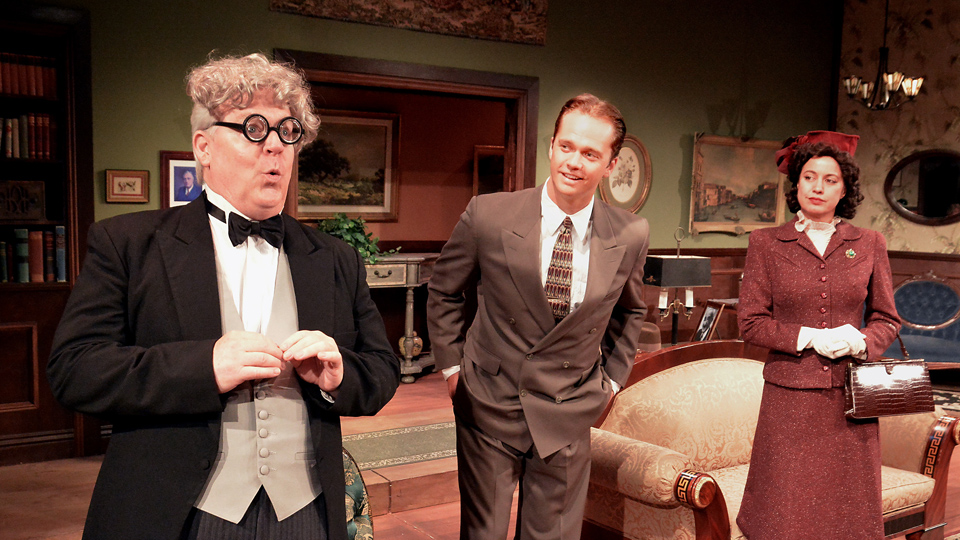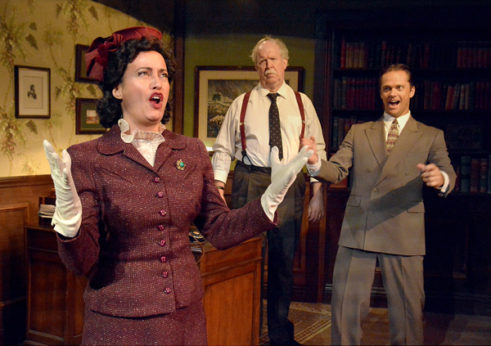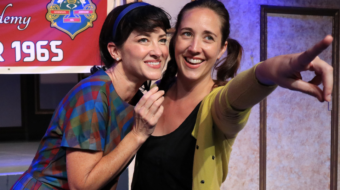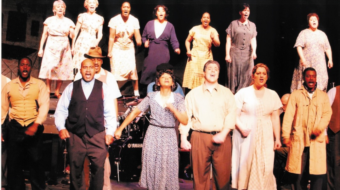
In Norm Foster’s Screwball Comedy the Canadian playwright emulates movies of the film genre of the same name that had their heyday during the Depression. These breezy pictures were known for their clever, rapid fire patter and word play, with droll dialogue and plots penned by witty wags such as Ben Hecht, Charles MacArthur, Moss Hart and George S. Kaufman.
The movie Foster’s Screwball Comedy reminded me of most was His Girl Friday, which was so popular it has been made several times, including in 1940 by Howard Hawks, with Grant and Rosalind Russell. It adapted Hecht and MacArthur’s play The Front Page and is reminiscent of the two-acter playing at Theatre 40 until August 19 because the main characters are reporters.
Mary Hayes (Kate Whitney) aspires to be a journalist for the daily and has an obligatory cute meet with Jeff Kincaid (Lane Compton), the newspaper’s ace reporter (who has been slipping up and slacking off lately) in the office of the gruff editor (nicknamed for some inexplicable reason) “Bosco” Godfrey. From behind a John Bolton-like mustache Daniel Leslie plays the character who is likely a reference to the hilarious butler portrayed by William Powell in 1936’s My Man Godfrey, co-starring Carole Lombard.
Godfrey pits Mary and Jeff against one another by having them compete on the same assignment. There is sexual frisson between the wannabe writer “wench” and the ink stained wretch from the get-go, and as in many Screwballs, the question is: Will they or won’t they (screw, that is)? The story Godfrey assigns them to cover, but in keeping with other Screwball genre conventions, involves what F. Scott Fitzgerald described as the individuals who aren’t like us: rich people.
For some strange reason both Mary and Jeff scheme to use their sex appeal when interviewing their bourgeoisie sources. Of course, from the standpoint of journalistic ethics, this is wildly unethical but hey, Foster is penning a comedy, not a treatise on ink slingers’ ethical guidelines. Having said that, considering the White House’s endless diatribes against “the enemy of the people” and “fake news,” Foster misses an opportunity to make points about the fourth estate in his script.
(Foster’s play premiered in Ontario in 2017 and may have been written before Trump’s tyrannical tirades. In any case, given the prevaricator-in-chief’s own infinite lies and penchant for secrecy, the definition of the former is “the enemy of the state” and the latter actually refers to extremely accurate investigative journalism that reveals matters the regime prefers to be hidden and covered up.)
Meanwhile, back at the review:
Niko Boles is droll as the idle, coddled rich boy Chauncey Diddle, who poses as an heir-head but isn’t quite as dopey as his mother Delores Diddle (Sharon Shayne) thinks her son is. (BTW, get the joke? “Diddle” is a reference to masturbation and this last name causes much knee slapping by cast members. Hardy har har.) Mary brings her seductive charms (such as they are, including an ostentatious slinky stroll) to bear on Chauncey (who reminded me of Tony Curtis pretending to be a moneybags in Billy Wilder’s latter day screwball, Some Like It Hot). Meanwhile, Jeff focuses on Gloria Fontana (Jean Mackie), trying to deduce whether or not Chauncey’s main squeeze is a gold digger.
As the daily’s wannabe Woodward and Bernstein probe in order to dig up the dirt, David Hunt Stafford as Reginald proceeds to steal every scene he’s in. Stafford’s delightfully daffy and irreverent Reginald is a butler in the mode of My Man Godfrey and Charles Laughton’s eponymous valet in Leo McCarey’s 1935 laugh fest Ruggles of Red Gap. This jocular play is worth seeing for Stafford’s haughty, resentful quipster alone. Used to watching Stafford introduce Theatre 40 productions as the Beverly Hills playhouse’s Artistic/Managing Director on opening nights, it was sheer pleasure watching him trod the boards as a thespian – fright wig and all. Bravo!

As a veteran of the Borscht Belt and TV sitcoms, helmer Howard Storm brings his comedic chops to bear in directing his cast’s crackling repartee and towards the play’s ultimate Capra-esque conclusion. Overall, Screwball Comedy is an amusing diversion and throwback to those 1930s/1940s Hollywood dream factory flicks, when quips and class made audiences chuckle on the silver screen. Along with laughs galore, when they took their well-deserved bows the cast received a standing ovation the night I saw the play.
The U.S. premiere of Screwball Comedy was performed through August 19 at Theatre 40 in the Reuben Cordova Theatre in Beverly Hills. To see the 2018/2019 season go to: https://theatre40.org/upcoming-productions/.










